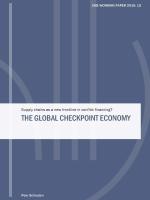The global checkpoint economy: a new frontline in conflict financing?
A new DIIS study presents an overview of the role of transit taxes levied at checkpoints in financing ongoing conflicts around the world. Compiling evidence from six different contexts, this DIIS Working Paper finds that in each of the conflicts, checkpoints form a key source of revenue for parties to the conflict. Whether in Afghanistan, the Democratic Republic of Congo, Somalia, Syria, the Central African Republic or Iraq, taxing passage is a consistent feature of how conflict actors sustain themselves.
Understanding how conflict is financed is important, because many external interventions try to stem conflict by cutting off sources of funding to parties in a conflict. In the past, research on conflict financing has disproportionately focused on so-called ‘conflict minerals’. This has led to new regulations and interventions targeting mining.
‘The purpose of compiling the available evidence is to call attention to other sources of conflict financing which are just as important’, Peer Schouten, author of the study, explains. ‘And the preliminary evidence certainly suggests that the “global checkpoint economy” is at least as pervasive as conflict minerals.’ Checkpoints and transit taxes are particularly important for armed actors that don’t control mineral-rich areas and have no outside support.
The DIIS study has two key policy implications:
First, across the cases, western aid organisations and multinational companies are structurally subject to illegal taxes levied by local conflict actors. Across the surveyed cases, local contractors for international clients pay hefty transit taxes to rebels, but the facts are hidden in complex global supply chains. Schouten asks: ‘Do we want our companies and humanitarian efforts to be complicit in sustaining these conflicts?’ Governments should require more transparency of companies sourcing from or operating in conflict-affected environments.
Second, given the profitability of checkpoint taxes, it seems that control over trade routes is turning into a major pivot of ongoing conflicts. ‘But the evidence is often still sketchy and buried within reports on other issues', Schouten finds. 'To really understand the scope and significance of this new trend, we need dedicated mappings and in-depth studies. Are rebels increasingly focusing their efforts around roads? Does this also mean more violent incidents occur around trade routes? We're really only scratching the surface here’, Peer Schouten says.
DIIS Experts



